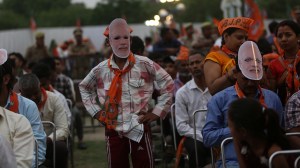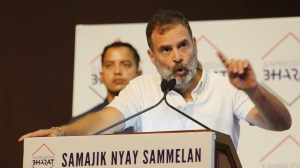- India
- International
From policy to family: How the Kamala Harris nomination is relevant to India
Kamala Harris has spoken out in defence of immigrants, was against Trump’s muslim immigrant ban, and has also spoken in favour of immigrant women seeking jobs as she has batted for the H-4 visas given to spouses of H-1B visa holders.
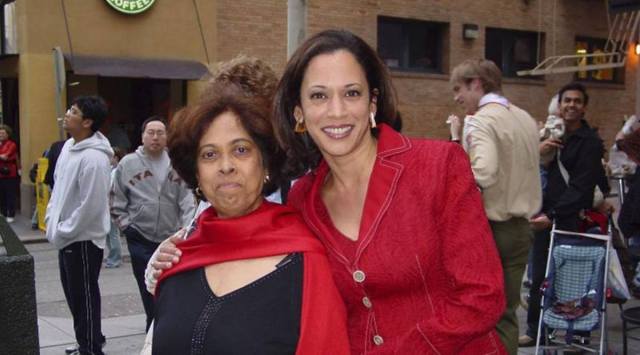 Kamala Harris with her mother, Shyamala, in 2017. (AP Photo)
Kamala Harris with her mother, Shyamala, in 2017. (AP Photo)Democratic Presidential candidate Joe Biden on Wednesday named Kamala Harris as his vice-presidential nominee, ending weeks of speculation over who his running mate would be.
Harris’ nomination is very relevant to India: she had backed another US Congresswoman, Pramila Jayapal, and had obliquely criticised External Affairs minister S Jaishankar in December last year for not meeting her and other Congress members due to Jayapal’s criticism of the Indian government regarding Kashmir. On another occasion, when she was asked to comment on the Kashmir situation after the abrogation of Article 370, she had said, “we are watching”.
She has invoked her Indian mother on several occasions, especially in the last four years as a Senator, and had even referenced Indira Gandhi as one of the strongest women leaders. She has also spoken out in defence of immigrants, was against Trump’s muslim immigrant ban, and has also spoken in favour of immigrant women seeking jobs as she has batted for the H-4 visas given to spouses of H-1B visa holders.
She has also spoken out against China’s human rights record, especially with regards to Uighurs, and has voted in the US Senate against China’s track record.

Harris, whose mother was an Indian, was born and raised in the US. Her selection as the VP nominee not only makes her the first woman of colour to be on the top ticket at the US elections, but also positions herself at the top rung of the Democratic party.
But her relevance to India is not just because of her Indian roots, although she has been quite vocal of her Indian ancestry especially in the last 4 years in the US Senate.
READ | Donald Trump calls Kamala Harris ‘meanest’ and ‘most horrible’ US Senator
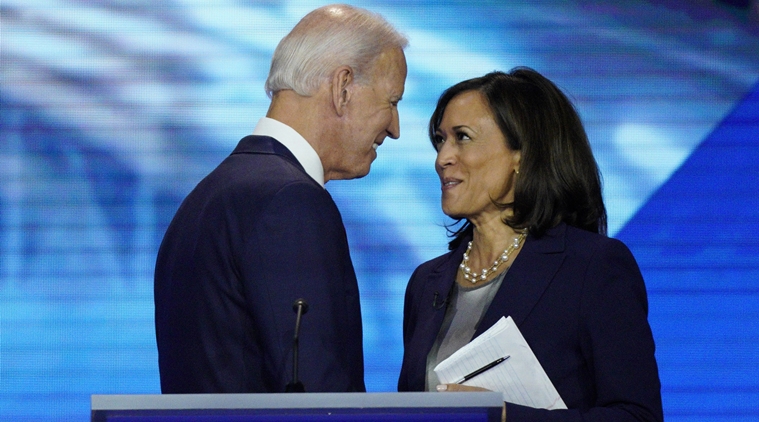 FILE – In this Sept. 12, 2019, file photo, Democratic presidential candidate former Vice President Joe Biden, left, and then-candidate Sen. Kamala Harris, D-Calif. shake hands after a Democratic presidential primary debate hosted by ABC at Texas Southern University in Houston. Biden has chosen Harris as his running mate. (AP Photo/David J. Phillip, File)
FILE – In this Sept. 12, 2019, file photo, Democratic presidential candidate former Vice President Joe Biden, left, and then-candidate Sen. Kamala Harris, D-Calif. shake hands after a Democratic presidential primary debate hosted by ABC at Texas Southern University in Houston. Biden has chosen Harris as his running mate. (AP Photo/David J. Phillip, File)
The Jaishankar-Jayapal incident
In December 2019, when External Affairs minister S Jaishankar was to meet members of the US House Foreign Affairs Committee, which also included another Indian-origin US Congresswoman, Pramila Jayapal, he apparently told the chairman of the committee, Eliot Engel, that he would not meet the panel unless Jayapal was dropped. Engel refused to entertain the request and the scheduled meeting was cancelled at the last moment.
Harris backed her colleague in a tweet saying, “It’s wrong for any foreign government to tell Congress what members are allowed in meetings on Capitol Hill.” The first US Senator of Indian origin, Harris said she stands with Jayapal. “I’m glad her colleagues in the House did too,” she said.
READ | How it happened: Inside Joe Biden’s search for a running mate
Indian origin
Regarding her maternal ancestry from India, she has said, “I come from a long line of tough, trailblazing, phenomenal women. My grandmother would go into villages in India with a bullhorn, telling poor women how to access birth control. My mother came to the United States at the age of 19 to study endocrinology at UC Berkeley and eventually became a leading breast cancer researcher.”
Her mother has been a recurring a theme in many of her speeches. On July 03, 2017, at a ceremony where 41 children and youth were being sworn in as US citizens, she said, “Looking at this group, I can’t help but think of a young woman roughly the age of many of you. She was born in Chennai, in the south of India, where she had been a talented singer and a precocious student. And this young woman dreamed of becoming a scientist. She wanted to study at one of the top universities in the world, the University of California, Berkeley. She was only 19, but her father let her travel halfway around the world, with the agreement that when she finished school she would return home to a traditional Indian marriage.”
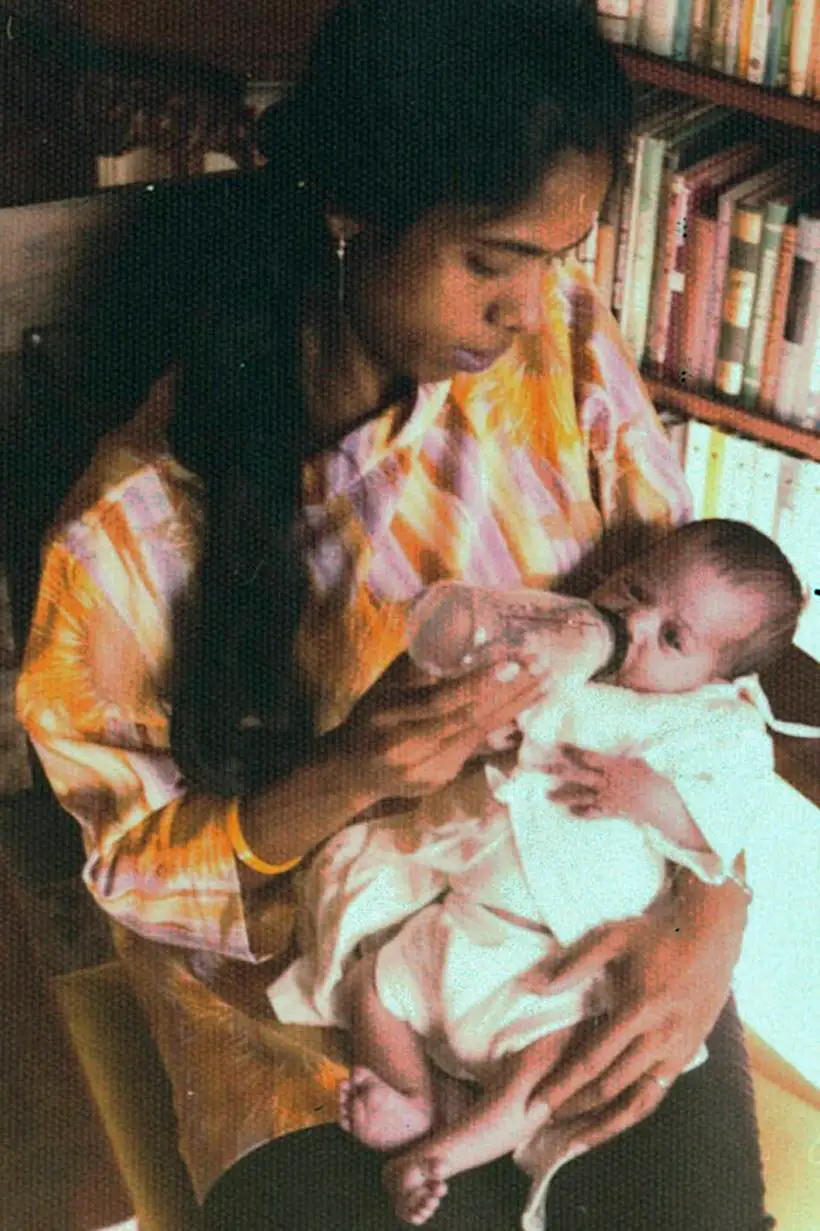 In this undated photo provided by the Kamala Harris campaign in April 2019, Shyamala Gopalan Harris, 25, holds her baby, Kamala. (Kamala Harris campaign via AP)
In this undated photo provided by the Kamala Harris campaign in April 2019, Shyamala Gopalan Harris, 25, holds her baby, Kamala. (Kamala Harris campaign via AP)
“But at Berkeley, this young woman met a young man, also an immigrant. A top economics student from Jamaica. And so, instead of an arranged marriage, she went against thousands of years of tradition and chose a love marriage. That woman was my mother, Shyamala Gopalan. It was a hard choice and a brave choice that she made, fuelled by love and optimism,” she said.
READ | Kamala Harris’ selection as VP resonates with Black women
Support for H-4 visas
On September 26, 2018, she and another US Congresswoman Kirsten Gillibrand (D-NY) sent a letter to the US Department of Homeland Security (DHS) Secretary Kirstjen Nielsen and US Citizenship and Immigration Services (USCIS) Director L Francis Cissna urging them not to revoke employment authorisation for roughly 100,000 high-skilled immigrant women currently covered under the “H-4 rule”. Under the rule, the women, who are mostly South Asian, are able to employ their education and professional training in the US as doctors, nurses, scientists, teachers, academics and technology professionals, amongst other careers in high-demand, skilled fields. These H-4 visa holders are spouses of H-1B visa holders.
Criticism from US Sikhs
Harris has faced criticism from the Sikh community. In July 2019, a group of Sikh activists had launched an online petition asking her to apologise to the community for allegedly defending a discriminatory policy in 2011 that prohibited state prison guards from keeping beards for religious reasons, even though exceptions were given for medical reasons.
Apr 24: Latest News
- 01
- 02
- 03
- 04
- 05
















